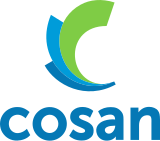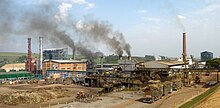Cosan
 | |
| Company type | Sociedade Anônima |
|---|---|
| B3: CSAN3, CZLT11 NYSE: CZZ | |
| Industry | Conglomerate |
| Founded | 1936 |
| Headquarters | São Paulo, Brazil |
Key people | Marcos Marinho Lutz (CEO) |
| Products | Foods Ethanol Fuel Logistics |
| Revenue | |
Number of employees | 45,000 |
| Subsidiaries | Raízen Rumo Cosan Lubrificantes Radar Propriedades Comgás |
| Website | www.cosan.com.br |
Cosan is a public listed company, a Brazilian conglomerate producer of bioethanol, sugar, energy and foods. The company operates in Brazil, Uruguay, Paraguay, Bolivia and United Kingdom.
History
Cosan began in 1936 in Piracicaba city in State of São Paulo, with the founding of its first factory for milling of sugar cane. From the second half of the 1980s, it quickly expanded operations through the acquisition of several factories in the State of São Paulo. Cosan cultivates, collects and processes sugar cane, the main raw material used in the production of sugar and ethanol. Its 23 plants occupy almost 600,000 hectares of land and employ 45,000 people. In the food sector the company owns 11.5% of shares of Camil Alimentos, that merged with Cosan Alimentos in 2012.
Purchases and mergers
On April 24, 2008 Cosan announced the purchase of the portfolio of downstream fuel distribution plants from Esso in Brazil.
On March 13, 2009, the Group confirmed the incorporation of NovAmérica Agroenergia through a stock exchange operation between the Cosan and holding Rezende Barbosa, controller of NovAmérica.[1][2] With the acquisition, the group Cosan reinforces its position as the largest producer of sugar and alcohol in the world and will have an annual processing capacity of around 56 million tonnes of sugar cane, 10% of the Brazilian market, managing 23 plants.
On 3 May 2012, Cosan signed a memorandum of understanding to acquire the BG Group's 60.1% stake in Comgás.[3] The deal was completed in November 2012.[4]
Joint-Venture with Royal Dutch Shell

On February 1, 2010 Cosan and Royal Dutch Shell announced the creation of a joint venture Raízen that merged their operations of sugar, ethanol and the distribution and marketing of fuels in Brazil. It formed the third largest distribution company in Brazil and the world's largest bioenergy operation.[5] The company is valued at US$12 billion.
Criticisms
In 2010, the company was added to a list of companies with workers toiling in slave-like conditions and as a result, the company's shares fell. [6]
References
- ^ http://www.brazzilmag.com/content/view/9269/1/
- ^ "Brazil's Cosan takes over NovAmerica, boosting lead in ethanol". Chemical Business Newsbase. 13 March 2009.
- ^ Lewis, Josh (2012-05-03). "BG to offload Comgas stake". Upstream Online. NHST Media Group. Retrieved 2012-05-03.
- ^ "BG Group Closes Sale Of Comgás Stake - Quick Facts". RTT News. 2012-11-06. Retrieved 2012-12-03.
- ^ "Shell bets on ethanol in $21 billion deal with Brazil's Cosan". Reuters. 1 February 2010.
- ^ http://www.bloomberg.com/apps/news?pid=newsarchive&sid=a7nxeycdMICM
